(Note: This post is part of an on-going series on financial literacy. Two of the goals of Prosper Waco have to do with accumulating wealth: (1) Reduce the percentage of Waco-area households living without three months’ worth of savings if they were not able to work. (2) More than 50 percent of Waco households will have a net worth above $15,000. Our hope is that this series will help move our community towards accomplishing these goals both by sharing information about some of the challenges, complexities and practicalities of managing finances. For other posts in this series, click here: Financial Freedom. — ABT)
By Phil Oliver
Welcome to undoubtedly the most generous, unplanned, impulsive time of spending in America—–Thanksgiving and Christmas!!
These wonderful times encourage us to give and spend freely on the ones we love and causes we passionately care about.
So, how do YOU plan to balance the WANT to give with the healthy ABILITY to give without growing debt that will last long into next year? This is the question that many families and individuals struggle with as they face ever tightening budgetary situations.
I addressed the main component of this desire in my very first blog about motivation. Refuse to give in to the ever increasing pattern of proving and buying love with stuff, but rather deepen and extend love with time, involvement and more stress-free planned giving/spending. Each family and individual can have a WONDERFUL giving experience as they realistically plan for the stuff and then intentionally budget their time for more longer-lasting relational investing.
First, the Christmas gift giving season demands advanced planning. Luckily, it happens each year at the same time, so it can be expected and anticipated. Ideally, each family would have a little savings set aside every month for gifts and celebrations that would include a large portion for Christmas– gift giving, travel, food, and decorations.
The reality for most is that this doesn’t happen. As the holidays approach the excitement (and tension) grows for the individual gift purchases and with it the expectations to show love and appreciation with stuff.
What to do?
- If you haven’t yet set a Christmas spending plan, do it NOW!!
- Determine ALL the people, agencies, organizations and ministries that you plan to give to and prioritize.
- Determine closely and reasonably how much money you have available to spend. This could be from your current savings, extra work, or even spending less on yourself.
- Let your entire household help decide on any spending outside your direct family. DON’T BORROW ON ANY ANTICIPATED IRS REFUND!!
- Write down the individual people and organizations and divide the money you currently have to give to each. Then, you can also include an additional percentage of any extra money that comes in before the gift is given. You would probably want that to be for close family members.
- Use your listed amounts and look/search online and sales for items that you and your family want to purchase for the best deals. Also, consider gently used items that are more budget friendly.
- Commit as a family to follow your budget without borrowing or going into more debt. Involve even the youngest in the process–make it a game and be creative together!
- Plan for shared shopping, buying, and wrapping. It then becomes an exciting, shared giving experience/memory.
Here are some great apps that may also help in planning:
- EveryDollar (free for Android and iOS) — Christmas and all year
- Santa’s Bag – Christmas Gift List (free) — Specifically Christmas spending
Here are some links for more ideas to help:
- “11 Tips For Holiday Shopping That Won’t Break The Bank”
- “The Christmas Budget You’ve Always Wanted”
As you and your family begin to look at areas of seasonal financial health and security, I hope some of this information will help to propel your progress to include intentional generosity in ALL your financial planning!
Finally, if you have decided you want to start a comprehensive financial plan for your family, please check out the Federal Reserve’s Free publications and web resources that have been endorsed by many of our local financial institutions as well as Prosper Waco:
Have a WONDERFUL, FINANCIALLY HEALTHY holiday season with family and friends!!
 Phil Oliver is a retired educator. He is an independent Financial Coach, active mentor, and community activist. He has spent the last 8 years empowering individuals and families to take charge of their finances through his FLOW system. He is active in many community efforts to grow financial literacy and responsibility including Prosper Waco and Citizens for Responsible Lending. He consults with many local organizations to teach and inspire their efforts to empower clients in personal finances. You can contact him at: [email protected]
Phil Oliver is a retired educator. He is an independent Financial Coach, active mentor, and community activist. He has spent the last 8 years empowering individuals and families to take charge of their finances through his FLOW system. He is active in many community efforts to grow financial literacy and responsibility including Prosper Waco and Citizens for Responsible Lending. He consults with many local organizations to teach and inspire their efforts to empower clients in personal finances. You can contact him at: [email protected]
The Act Locally Waco blog publishes posts with a connection to these aspirations for Waco. If you are interested in writing for the Act Locally Waco Blog, please email [email protected] for more information.
By Diego Loredo
It’s already the end of the semester! If you had told me at the beginning of the semester that it would be over before I knew it, I probably wouldn’t have believed you. However, the end of the semester is already here. And, all of the assignments and projects that I pushed off are finally catching up with me!
I have three group projects, one presentation, and three final exams to take. Two of those group projects are for one class and the other group project (along with the presentation) is for another class. I also have an exam on Monday, along with the final exams during the last week of the semester. Overall, I have quite a bit of work to do. It’s easy for all of your work to pile up on you during the last few weeks of the semester. So here’re a few tips on managing your work at the end of the semester, as well as a few final exam tips.
Use your time-off well
I know it’s hard to do work during a break but it’s a good idea to do it anyway. I know a lot of professors like to assign work during the Thanksgiving break so most students will be doing work anyway. Don’t do too much work during the break or you’ll burn yourself out too. But, dedicate a day or two to catch up on work or study for upcoming exams.
Keep in touch with group members
If you’re doing a group assignment, make sure to keep in touch with your group members so that all of you know what to do. Don’t be that group member who doesn’t ever reach out to the other members.
Bring textbooks with you back home
It’s easy to forget that you have work to do when you’re going back home for the break. If you have to study or have work to do, bring whatever you need that will help (textbooks, notes, etc.). Make sure to have what you need so that you won’t have to drive all the way back or blow off the assignment.
Keep track of your exam schedule
Mark on your calendar when and where your exams will be. I have a friend who missed an exam because he didn’t check the syllabus right and went to class during the wrong time and missed the exam, ultimately failing the class. Make sure ahead of time that you know when your exams are, so that you don’t risk missing them.
I know how difficult the last few weeks of the semester can be. I’m taking a senior level class and all of the seniors there are stressing over the final project. I’m still a junior but I’m still stressing out just as much if not more than them. I tried to come up with these tips based on my personal experience and hopefully they can help other students who are preparing for finals or projects. Good luck! Finish strong!
 Diego Loredo is a junior at the University of North Texas and is majoring in public relations. He is a scholarship recipient of the Brazos Education Foundation, otherwise known as “Brazos Scholars.” He graduated from University High School in 2014. He plans on working in sports PR or for a nonprofit. He loves to play soccer and is a huge FC Dallas fan. Have something that you would like Diego to write about or have a problem that you would like to ask him? Shoot him an email at [email protected].
Diego Loredo is a junior at the University of North Texas and is majoring in public relations. He is a scholarship recipient of the Brazos Education Foundation, otherwise known as “Brazos Scholars.” He graduated from University High School in 2014. He plans on working in sports PR or for a nonprofit. He loves to play soccer and is a huge FC Dallas fan. Have something that you would like Diego to write about or have a problem that you would like to ask him? Shoot him an email at [email protected].
The Act Locally Waco blog publishes posts with a connection to these aspirations for Waco. If you are interested in writing for the Act Locally Waco Blog, please email [email protected] for more information.
By Alan Northcutt
Solar panels, also called photovoltaic cells, were installed on my roof around New Year’s Day 2016. Since that time my average electricity bill has been $3.13. In fact, for 3 of those months my bill was $0.00. Yes, $0.00. So I would like to share my amazing experience with solar energy through a practical overview applicable to Central Texas.
Cost. Although the exact price of a home solar system depends on multiple variables, I will provide a general example for illustration. Importantly, now is an excellent time to go solar in light of plummeting panel prices and available incentives. A 7.5kW system (producing about 850kWh per month) has an invoice price of approximately $25,000. If the home is within their service area, ONCOR’s generous incentive would lower the purchase price to $20,000. And at income tax time, the 30% federal tax credit of $6000 would further lower the final price to only $14,000. The average time to pay for a system with electric bill savings is 7 to 8 years. After that, the system generates income, through these lower or absent electric bills.
Obstacles. The primary requirement is that the roof be unobstructed by trees or other objects. (But if an obstruction exists, many installers erect ground based solar arrays in the customer’s backyard.) A south facing roof generates maximum energy, but is not mandatory. Finally, homeowners’ associations will often assert that rooftop solar is not allowed. Fortunately, this claim is false, and these associations are not able to restrict solar installations in Texas. In reality, solar panels are not an aesthetic detriment to the roof. Their sleek, black futuristic appearance is actually an improvement over mundane gray shingles.
Installation. Waco is fortunate to have an excellent, experienced local installer in Holtek Solar, my provider. One advantage of a local business is the rapid attention paid to any questions or problems. Another option is Freedom Solar, based in Austin, which offers a no money down plan, with monthly payments. Installation involves attaching the panels to the roof, attaching the inverter (converts DC to usable AC) to an outside wall, and wiring the system components, connecting to the existing electric service. The process surprisingly only takes a couple of days.
Operation. One delight of home solar is monitoring the function of the system. Through one’s computer or smart phone app, the system data is displayed: weather conditions; daily output graph; weekly, monthly and annual outputs; individual panel generation; and cumulative cost savings in dollars. And through net metering, the excess production during the sunny hours is credited by the grid provider, lowering one’s electricity bill.
Maintenance. With no moving parts, solar panels are essentially care free. If the data monitor does show an output drop from a given panel, a cleansing spray of water is corrective. But in 10 months of operation, my system has required no maintenance.
Rationale. In conclusion, the reasons to install rooftop solar are multiple:
- Once the system cost is recovered, monthly electricity bill savings represent income. Further, the systems are guaranteed to produce 80% of initial output for 25 years!
- Home value may increase 3 to 4% upon the addition of rooftop solar systems, according to a 2011 study by the National Bureau of Economic Research.
- Conversion of the world’s energy system to renewables is a race against time, to avoid climate change catastrophe. Installation of residential solar is a powerful contribution toward winning this race.
- The immediate lightening of one’s greenhouse gas footprint is a potent step to combat anthropogenic climate change.
- Decreasing the use of fossil fuel energy helps combat its serious health impacts, including lung disease, cardiovascular disease, and 30,100 premature US deaths per year.
“Sunshine is Nature’s hug and spirit breath to the earth,” wrote Terri Guillemets. I concur with this sentiment, and invite others to consider powering their homes with this limitless, clean, zero carbon resource.
 Alan D. Northcutt, M.D., is a local physician and director of the Waco Friends of Peace/Climate (www.friendsofpeace.org).
Alan D. Northcutt, M.D., is a local physician and director of the Waco Friends of Peace/Climate (www.friendsofpeace.org).
Justification. The reasons to install rooftop solar are multiple:
(WISD is working hard for the children in our community. Today’s blog post is the first in a series of five WISD innovations that every Wacoan should learn about and celebrate! — ABT)
Psst! Hey! Waco ISD eighth graders! Did you know that you can earn an associates degree, at no charge to you, BEFORE you graduate from high school?
Take a minute to absorb that statement. A college degree. No cost to you. Before you graduate from high school.
It may seem a little intimidating to start thinking about college classes when you are in eighth grade (or 9th, or 10th or 11th grade), but there are plenty of people at Waco ISD who want to answer your questions and help you succeed! Why not check it out? Dual credit could set you on a path that can save you a pile of college tuition money and open up all kinds of new opportunities for you.
If you were worried about how you were going to pay for a 2-year degree, you can do it while you are in high school at the district’s expense! WISD pays for your tuition and will even pay for the books and fees. Yes, you have to plan ahead and work hard. But, Yes, it’s very possible. If you were planning on earning a four-year degree (or beyond), then you can basically get the first two years for free. Who wouldn’t want to do that?
“What? What?” you say, “Why didn’t I know about this?” Well, it’s pretty new.
Up until June of 2015, dual credit options were much more limited – you had to be in eleventh or twelfth grade, and you could only take a maximum of two classes per semester. But, Texas House Bill 505, which was signed into law in 2015, removed the restrictions on dual credit courses and opened the door to allow school districts and colleges to use state funds to help pay for dual credit classes. Then, in November of 2015, Waco voters ratified an additional tax to support WISD; part of that money is earmarked to help pay for dual credit. Lucky for you, Waco ISD has taken full advantage of these two changes to offer you a treasure trove of dual credit opportunities. Your options include everything from taking a few classes here and there to completing an entire associates degree while still in high school.
Here are some of the possibilities:
- Accelerate Early Degree program – This is a big deal! If you enter this program in ninth grade you can graduate with both a high school diploma and any one of several associates degrees from MCC including the following: Allied Health, General Business, Information Systems and Applications, Criminal Justice, General Science (designed to transfer to a four-year degree), Liberal Arts (designed to transfer to a four-year degree).
- MCC + 1 Program – Through this program you can complete 18-23 dual credit hours during high school. This allows you to complete an associate’s degree within one calendar year at MCC. You don’t have to start this one until you are a junior.
- Advanced Manufacturing Academy (GWAMA) /Advanced Health Care academy (GWACHA) –In both of these programs, you can earn dual credit toward a degree or technical certificate from MCC or TSTC.
- Just take a few classes – Not sure you want to plunge into a whole degree or certificate program while you are in high school? You don’t have to. But, you might want to take just one or two dual credit classes. That is certainly a possibility as well.
Want to learn more about it? The Advanced Academic Services Department at Waco ISD is working with the Waco Foundation to offer some student/parent workshops to give you all the details. The next session is on November 29 and it’s all about dual credit: What it is, why it is beneficial, how to enroll, and key deadlines to make sure you have the opportunity to take advantage of all the possibilities open to you. The ACCELERATE Early Degree program will also be explained in preparation for the December 1 opening of the application window. Target audience: 8th graders, Freshmen, Sophomores, Juniors and their parents. Date: November 29. Time: 6:15-7:15pm. Location: Waco High School, 2020 N 42nd St., Performing Arts Center. Even if you can’t make the meeting, you can still get the information you need. Get in touch with Scott McClanahan at Waco ISD. Call 254-755-9473 or email [email protected].
Psst! Hey! Waco community! I’m sure I don’t have to tell you that people who earn a workforce certificate or college degree almost always end up making more money than people with a high school diploma or less. The question is not whether our young people need that higher level of education, but how we can make sure they get it. It’s a complicated question. Dual credit can certainly be part of the answer, and Waco ISD is one of the leaders in central Texas when it comes to making dual credit available to our students. It is an innovation we should all celebrate.
Some our Waco ISD students face many barriers to obtaining a degree or certificate, but for some it’s a matter of knowing the options available and having someone encourage them to take advantage of those options. WISD is doing its part to make dual credit options available – let’s do our part to make sure every student in Waco knows about the possibilities and has someone cheering them on and encouraging them to take advantage of all WISD has to offer!
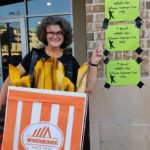 This Act Locally Waco blog post is by Ashley Bean Thornton, she works at Baylor, helps out with Act locally Waco, and facilitates the Waco Foundational Employment Network which is a part of Prosper Waco. She likes to walk and doesn’t mind at all if you honk and wave when you see her.
This Act Locally Waco blog post is by Ashley Bean Thornton, she works at Baylor, helps out with Act locally Waco, and facilitates the Waco Foundational Employment Network which is a part of Prosper Waco. She likes to walk and doesn’t mind at all if you honk and wave when you see her.
The Act Locally Waco blog publishes posts with a connection to these aspirations for Waco. If you are interested in writing for the Act Locally Waco Blog, please email [email protected] for more information.
By Kelsey Leigh Ervi
On November 15, I received a message from my father. He had forwarded me an email he received from the church I grew up in. The church that helped shaped my faith. The church I was baptized in. The church I committed to Christ in. The church I left in the spring of 2007.
The email that my father forwarded me was regarding the upcoming congregational discussion and vote on revising the church bylaws. Attached to the email was a document entitled “Welcoming and Affirming Statement Packet.” I knew immediately what that meant.
The church I grew up in has always been an open and inclusive place of worship. My parents neither of whom were of devout spirituality when I was a child, wanted to introduce my sister and I to God in a healthy and non-aggressive way. I think both of my parents saw the importance in allowing their children to discover their own beliefs and to navigate through faith in their own way and on their own schedule. This particular church provided that kind of environment and we all attended the church for many years. My journey through faith, however, was a rocky one. I stumbled on many questions and doubts, and in one area over and over again, an area that would go on to be the biggest journey of my life.
I have known I was gay since I was a young child, my earliest memories point to age 6. But it wasn’t until I was 12 that I fully understood that being gay was considered different. That there was a status quo I no longer met. It was also at 12 that I truly recognized what fear was. For a young gay person in a conservative Texas town in 2002, fear was undeniable. And my 12-year-old self struggled through bouts of depression and identity crises, which meant I would remain closeted well into my teens.
Growing up gay in church was difficult as there were many contradicting statements being thrown my way from person to person. Growing up gay in America was difficult too, but over the last few years, things have been getting a lot better. Most notably the historic Supreme Court ruling that declared once and for all that everyone deserves the right to marry the person they love. I was in my office at work when the ruling went public. The final paragraph of the opinion that Justice Kennedy issued is written on my bedroom wall and has been since June 26, 2015. It’s the first thing I see when I wake up in the morning and the last thing I see when I go to bed each night. It feels like a blessing.
In regards to the upcoming discussion and vote, I read through the “Welcoming and Affirming Statement Packet” in its entirety and was very moved by it. As I said, I’ve always known the church I grew up in to be accepting, but to see the words written and to read the commitment this church wants to make to me and my LGBTQ brothers and sisters is something to be celebrated.
I know there are some who are concerned with the implications of disconnecting from the Baptist General Convention of Texas or the Waco Regional Baptist Association and, perhaps more seriously, to those worried about the response from Baylor, I understand their concerns, but I also ask them to reflect on Colossians 3: 12-16.
“Therefore, as God’s chosen people, holy and dearly loved, clothe yourselves with compassion, kindness, humility, gentleness and patience. Bear with each other and forgive one another if any of you has a grievance against someone. Forgive as the Lord forgave you. And over all these virtues put on love, which binds them all together in perfect unity. Let the peace of Christ rule in your hearts, since as members of one body you were called to peace. And be thankful. Let the message of Christ dwell among you richly as you teach and admonish one another with all wisdom through psalms, hymns, and songs from the Spirit, singing to God with gratitude in your hearts.”
Striving for what is right is the good of the Earth and sometimes we have to remind others of that. I hope this church and other churches will adopt “welcoming and affirming statements” because it is what is right and good.
Even when those inside a church are accepting and affirming it is still important to have an explicit statement. Many members of the LGBTQ community assume that they would not be welcomed in church and many of them have been rejected from their friends and families. I have felt this at other churches, and people I once considered friends disavowed me because of this one trait that speaks to the very core of who I am. A trait that speaks to the very core of what I love about myself.
In light of recent events, I find myself mourning the potential loss of the blessing I have written on my wall and other liberties that still feel new. I, like many of my LGBTQ friends, are afraid of what’s to come and we will be seeking safe spaces and places with open doors and open arms. Our churches can be one of those places. The people of the church can make it so.
I will admit to you that I do not identify as a Christian. My decision to leave the church comes with many clauses, but my journey through faith did lead me to the ultimate belief that there is something bigger than myself and I will not attempt to know all the answers but I will do everything I can to ensure I live from a place of acceptance and respect. Two qualities of many that I find unwavering in my God. Your God and my God are alike in this, I think. My God is one of love, one of compassion. My God is open and inviting. My God is a really good listener. And my God believes we are imperfect beings whose curiosity and benevolence are two of our greatest strengths. I think your God is all of these things too.
 Kelsey Leigh Ervi is a Dallas-based multidisciplinary theatre artist. As a director, actor and playwright, Kelsey’s work has been highly regarded by various publications including The Dallas Morning News, Dallas Observer, TheaterJones, and D Magazine. Kelsey’s directing work is geared towards ensemble-driven texts, bare-bones storytelling, object-puppetry, and work of the queer voice. When she’s not working in theatre, Kelsey can be heard talking about it. In November of 2015, she joined forces with two other Dallas artists and launched the Little Big Scene Podcast, a monthly podcast which serves to promote the past, present and future of the Dallas-Fort Worth theatre community. She currently serves as Associate Artistic Director for WaterTower Theatre in Addison, TX.
Kelsey Leigh Ervi is a Dallas-based multidisciplinary theatre artist. As a director, actor and playwright, Kelsey’s work has been highly regarded by various publications including The Dallas Morning News, Dallas Observer, TheaterJones, and D Magazine. Kelsey’s directing work is geared towards ensemble-driven texts, bare-bones storytelling, object-puppetry, and work of the queer voice. When she’s not working in theatre, Kelsey can be heard talking about it. In November of 2015, she joined forces with two other Dallas artists and launched the Little Big Scene Podcast, a monthly podcast which serves to promote the past, present and future of the Dallas-Fort Worth theatre community. She currently serves as Associate Artistic Director for WaterTower Theatre in Addison, TX.
The Act Locally Waco blog publishes posts with a connection to these aspirations for Waco. If you are interested in writing for the Act Locally Waco Blog, please email [email protected] for more information.
By Bruce Huff
“Fined $50 For Littering!” This is the catalyst for the song “Alice’s Restaurant Massacre,” written, recorded and experienced by Arlo Guthrie in 1967 during the VietNam War, and played as a cult song on Thanksgiving Day, every year since without fail.
I’m not sure the song’s message means more to me as someone who enlisted in the military because of the threat of prosecution, or because the hero of the story got a littering fine of $50. I got over the enlistment pretty fast, but the littering… not so much! Mind you, I am not the tidiest person around, but I HATE LITTER! I’ll go out of my way if I see an accumulation of trash. We, have made this trash. We purchased every piece of McRib wrapper, every napkin, every sack to bag your lunch, the cardboard box that blew off the top of our trash truck, the cigarette butts thrown in the curb and stay. Somehow, all this trash we see is created. Somehow, all this trash never gets picked up. Somehow, a Christmas tree sits dead all year on the island at Valley Mills and Waco Dr. in front of the U-Haul store, since, yes, Christmas.
Multiple Sclerosis forced me to retire early as my balance and fatigue were playing havoc on my day-to-day activities. That gave me time to help my city: Waco, Texas. I was born here 64 years ago. Waco was trashy then….sadly, Waco is trashy now. Just look out of your window, Trash at the next traffic light. Trash right across mansions on Ridgewood Drive. Trash in our river. Trash in our river. Trash in our river….Every day I look around downtown, the highways, alleyways and neighborhoods where I saw trash, litter, open dumpsters…it’s so bad that when it rains, the Brazos River dumps literally tons of waste. Who cleans all this mess? For the past two years, I have been ambling along, with my cane or mobility scooter, in a vacant lot, along the river, or in neighborhoods picking up your trash, our trash.
Finally, I realized it was just senseless to do this on my own, so I went to City Council with my “Wild About Waco” tee shirt and proclaimed, “I am Wild About Waco but not wild about our trash!” Like magic, they tripled the budget for downtown cleanup! So this is how the wheels of government work! A friend asked if she could join me, so we brainstormed one day about how we could organize a group of Senior Citizens to show our community- to make a social statement. Then, Alice’s Restaurant came to mind and we decided to call ourselves the “Group W Bench.”
In the song, Arlo is sent for evaluation as he is a malcontent, arrested for littering. The induction center put him on the “Group W Bench” with all the other malcontents for creating a nuisance, and he was asked, “Son, are you moral enough to join the Army after committing your special crime” of littering… Littering?
Later on in the song Arlo belts out, “Let’s start a movement! Sing a bar of Alice’s Restaurant, then another…before too long the whole country will feel like I did way back then.” We are starting an anti-litter movement in Waco, Texas! Thanksgiving Day is the 49th Anniversary of Alice’s Restaurant Massacre. On the Saturday after Thanksgiving (November 26) The Group W Bench will assemble at Indian Springs Park Suspension Bridge to clean up part of our city, and events are planned to continue the vision. The City of Waco Director for Solid Waste feels public help is needed as the city doesn’t have the resources. Do we wait for funding, or do we set an example now? The movement has started in Waco! It’s time to change our attitudes about trash across the USA. What happened to “Give A Hoot, Don’t Pollute”? What happened to picking up trash, pennies, soda bottles and straightening a neighbor’s fence? LET’S START A MOVEMENT!
Please join us on the Group W Bench! We are a group of senior citizens, church groups, Baylor fraternities, disabled and misfits who will gather on Saturday, November 26 from 12-3 Waco Suspension Bridge to clean our streets, one at a time! And remember, “You can get anything you want at Alice’s Restaurant.”
 Bruce Huff has Multiple Sclerosis, is semi-retired and now an activist in Waco, Texas
Bruce Huff has Multiple Sclerosis, is semi-retired and now an activist in Waco, Texas
The Act Locally Waco blog publishes posts with a connection to these aspirations for Waco. If you are interested in writing for the Act Locally Waco Blog, please email [email protected] for more information.
By Leslie King
In the early 1990s I lived on the South side of Chicago. Safety was an issue, so I did what people sometimes do: I went in search of a dog. At the Chicago animal shelter I met Lucky. She was a young Shepherd/Collie mutt. There was something about her…the commanding ears, the dark serious eyes. I thought, “She will keep me safe.” We became regular features at the seminary courtyard that doubled as a dog park several times a day.
When new dogs came to the dog park, Lucky greeted them from head to tail and ran around them as if blessing their presence. She would do a victory lap around the perimeter for each dog who entered. She did this for three years; each and every dog received her shepherding attention. Her shepherding instinct is a beautiful memory for me. She took in whoever arrived. There was some crazy diversity at the dog park. Lucky shepherded the diversity as it arrived.
First Presbyterian Church, like any downtown congregation, has had to have a similar discipline. Diversity has risen up around our congregation over its better than 150 years. Not too many years ago, we had a decision to make in the midst of urban blight and sprawl. The question was, would we continue our ministry in this location or would we find greener pastures?
Even though there were more vacant buildings than occupied, and there was no promise of an uptick in its economy on the horizon, we chose to stick with downtown Waco. First Presbyterian stayed committed to the complex and diverse urban environment.
Years later, things are booming. It’s so very exciting to see the development and expansion. We have stayed mindful of the growing pains as development increases values and taxes. We have held in prayer those who live in poverty, our neighbors at Talitha Koum and Mission Waco, who have settled into an urban core only to experience displacement as it develops. As Waco took off, we knew that sooner or later the issue of how to shepherd in this city would come knocking on our door. And it has…literally…
A real estate developer dropped by the church office one Monday morning asking to speak with me. We were not very far into our conversation when I realized that he was not coming to tell me about changes in the neighborhood. Rather he was coming to invite me/us to help make some changes happen. He looked at me with bright and twinkling eyes and said, “For a mere $200,000, we can simply make Oak Lodge go away!”
Oak Lodge is the Motor Inn across the street from the church. I wouldn’t be surprised to hear some call it a “flophouse.” It is an example of the diversity that has arrived as the city has risen up around us. In our attempts to get to know and understand the people at Oak Lodge, we have appreciated the consultation of Jimmy Dorrell, who has cautioned us as middle class Americans. He has cautioned us about our intent to change people or transform them. He has said to me on more than one occasion, “Don’t try to fix all their problems; there are agencies who are working on that. Just begin learning their names. Look them in the eye and recognize their humanity so that they can recognize yours.” In other words, attend with a shepherding instinct that honors and gathers those who arrive to your shared space. He has been a good guide and friend to us because there are threats to the shepherding instinct.
A first threat has to do with our self-understanding. It is very tempting as church folks to understand that we are the flock to be cared for and guided. And that might be true inside the sanctuary walls, but beyond those walls we need to recognize that our true role is as ambassadors of the Shepherd.
A second threat is in regard to how shepherds work. It’s why Lucky is a helpful image to me of shepherding. You see, I am so often tempted to imagine that a shepherd shops for and selects the sheep. That there are some sheep that are suited to a flock and others that are not. It is humbling to remember that God as Shepherd does not preselect but welcomes and honors all.
So, Oak Lodge becomes a part of who we shepherd, and in so doing we learn from them. We learn about the complex of problems that mire people into difficult, even intractable, situations. Carefully and prayerfully, we take what we know from the challenges at Oak Lodge and we move into places where there is leverage and power for change, for example our partnership with Alta Vista Elementary.
Thanks to what we have learned from our friends at Oak Lodge, we arrive at Alta Vista taking seriously the threat that there are pipelines to prison, and holding onto our belief that the school is situated as a gateway for health, self-esteem, well-being and a promising future. Having learned from the neighbor whom we have sought to shepherd and by whom we have been shepherded, we arrive to Alta Vista with the shepherding instinct intact. We are ready to welcome, guide, instruct, encourage and receive inspiration from the children. We bind up their hope and ours. We bind up their confidence and ours. We bind up their will and ours. At the same time, we loosen the bondage of their fear and ours. We loosen the bonds of uncertainty and despair and in so doing we feel confidence and hope in the smallest achievements.
Around our little lot of land at First Presbyterian Church we have been privileged by neighbors who are postured to teach us if we are willing to learn. If we are willing to say “come to the party and tell us what you know, good bad and ugly,” if we stand alert and ready, then the church continues to be built in the only way it has ever been built, by building up others because we love God and believe in Christ.
 This week’s Act Locally Waco blog post is by Rev. Dr. Leslie Ann King of First Presbyterian Church, Waco. Would you like to write for the blog? If so, please email [email protected]. We would love to hear your thoughts on making Waco a great place to live for every person of every level of income.
This week’s Act Locally Waco blog post is by Rev. Dr. Leslie Ann King of First Presbyterian Church, Waco. Would you like to write for the blog? If so, please email [email protected]. We would love to hear your thoughts on making Waco a great place to live for every person of every level of income.
By Ashley Bean Thornton
(Have you ever been a part of a conversation where you just nodded and pretended you knew what was going on, when really you had no idea what people were talking about? If you do this long enough, you eventually get to the point that it’s embarrassing to ask, and you just make peace with stumbling along in ignorance. I know this from personal experience! For example, even though I think of myself as a fairly well informed citizen of Waco there are still some basic things about how the city works that I only vaguely understand. And – even though it probably only takes 5 minutes to Google it – I just never get around to it.
Assuming that I’m not the only one out there with this particular character flaw, Act Locally Waco is starting a blog series called “Waco 101.” The idea will be to use a blog post every now and then to explain some aspect of how the city works – maybe some term or process you read about in the paper all the time, but don’t really understand. It’s for those of us who want to be informed citizens, but are just too dang busy (or lazy!) to look stuff up. Do you have ideas for topics for this series? If so, send me an email at [email protected] and we’ll try to find someone to write about it. No one needs to know it was you who asked! Thanks! — ABT)
If you have ever read an article in the Trib about downtown Waco, you have probably come across the acronym “TIF,” as in…
- “$35 million TIF Grant to Baylor Stadium Project is right for downtown development”
- “Waco’s TIF Fund grows, building hope downtown,”
Or, most recently…
…but, what the heck is “TIF?”
The acronym “TIF” stands for “Tax Increment Financing.”
Tax Increment Financing (TIF) is a way for the city to encourage development in an economically distressed area by investing tax revenues. The basic idea is that there are certain areas in the city that would be beneficial to develop, but, to be frank, they are in such bad shape that it is difficult to entice investors to take the plunge. To help with this dilemma, the City of Waco can encourage investment by agreeing to pay some of the cost of the development. But, where would the money come from to do that you ask? Enter TIF!
The basic concept of TIF is that a distressed property has a certain original value that generates some amount of tax dollars. After it is renovated, it will have a new, higher value that will generate more tax dollars. This difference in the amount of taxes paid is the “increment” in Tax Increment Financing. The Tax Increment Financing model uses this projected increment to finance improvement projects.
Here’s how it works:
The city identifies a particular area that is economically distressed, but has potential for profitable development. This area is designated as a “TIF zone” for up to forty years. For example, in 1982 the City of Waco established “Reinvestment Zone #1,” which includes part of downtown and a large part of the river front (map). That area is designated a TIF zone until 2022.
Taxes collected the year the TIF zone was established are considered the “baseline” taxes for the zone. The Taxing entities (in our case, the City, McLennan County, McLennan Community College and WISD) agree that, for the length of the TIF agreement, they will take only that baseline amount each year. Any taxes collected above that baseline will be put into a fund to be reinvested in the TIF zone. This difference between the baseline taxes and the actual taxes collected is the “increment.”
TIF funds can be used for variety improvements: affordable housing, transit facilities, demolishing a building, or preserving the façade of a building, among others. (Here’s the link to the city’s TIF Guidelines.)
Developers who are interested in investing in the TIF zone can ask for TIF funding to help with eligible parts of their projects. This reduces the developer’s expenses and helps encourage renovation in the zone. When the renovation is complete, the property is more valuable, which results in higher property taxes, which replenishes the TIF fund.
Developers who are interested in receiving this kind of funding start the process by checking with the City Manager’s office to see what parts, if any, of their projects are eligible for TIF funding. If some parts are eligible, the developer may submit an application for formal consideration of funding.
Eligible funding requests are presented to the Board of Directors for the TIF zone. The Board of Directors is appointed by the taxing entities. There are eight members on each TIF board in Waco: one each appointed by Waco ISD, McLennan County, and McLennan Community College and five appointed by the Waco City Council. This board reviews the proposal and makes a recommendation to the City Council as to whether or not to accept the proposal.
If the City Council does accept the proposal, the city enters into a contract with the developer to reimburse the agreed upon TIF-eligible work.
This reimbursement might happen in any one of several ways, for example:
- The developer might pay the cost of the approved improvement, and then be reimbursed over time from the increased tax revenues, or…
- The city might pay for the improvement directly out of the existing TIF funds, or…
- the improvement might be paid for by the sale of a bond, that would then be repaid over time out of the tax increments.
This model of funding has been used to help incentivize all kinds of downtown Waco development projects from the MLK Pedestrian/Bike Trail, to the American Football Coaches Association parking lot to – more famously – parts of the McLane Stadium project and The Magnolia Silos project. The most recent big TIF commitment is for the “Brazos Promenade” riverfront development scheduled to break ground in 2017.
Clearly this model of funding has had a huge impact on Waco especially in downtown. It will be interesting to see what the future holds between now and 2022 when TIF zone #1 reverts back to the regular tax rolls!
 This Act Locally Waco blog post is by Ashley Bean Thornton, she works at Baylor, helps out with Act locally Waco, and facilitates the Waco Foundational Employment Network which is a part of Prosper Waco. She likes to walk and doesn’t mind at all if you honk and wave when you see her.
This Act Locally Waco blog post is by Ashley Bean Thornton, she works at Baylor, helps out with Act locally Waco, and facilitates the Waco Foundational Employment Network which is a part of Prosper Waco. She likes to walk and doesn’t mind at all if you honk and wave when you see her.
The Act Locally Waco blog publishes posts with a connection to these aspirations for Waco. If you are interested in writing for the Act Locally Waco Blog, please email [email protected] for more information.
By Larry Carpenter
“It’s the Most Wonderful Time of the Year!” Never have words been more true when thinking about the upcoming winter holiday season and all of the great holiday happenings scheduled with Waco ISD Fine Arts students. From musicals to concerts and ensembles to community service…there is something engaging for audiences of all ages and individual tastes. As the Director of Fine Arts for Waco ISD, having the holidays overflowing with cheer and excitement is truly a wonderful time of the year for me. Through our various activities and performances, we hope to spread that same joy to the Waco community. We hope you can come and join us at some, or even all, of our special holiday happenings this season. From WISD Fine Arts, many blessings to you all! Happy Holidays!
Waco ISD Fine Arts Holiday Happenings 2016
November 24
- UHS JROTC “Feed the Homeless” community service @ Salvation Army
December 1
- Indian Spring Jazz Band @ Richland Mall 2:00 p.m.
- UHS JROTC Color Guard @ WISD Outstanding Teacher @ UHS
December 2
- UHS/WHS Orchestra @ Waco Wonderland 5:00 p.m.
- UHS/WHS JV Orchestras @ Dr. Pepper Museum 8:00 p.m.
- Waco High Jazz Cats @ Waco Wonderland 8:00 p.m.
- Tennyson MS presents Elf, Jr. @ TMS 6:30 p.m.
December 3
- Brook Ave Choir @ Waco Wonderland TBD
- Tennyson MS presents Elf, Jr. & Dinner Theatre @ TMS 6:30 p.m.
December 4
- WHS Jazz Combo Performance @ Barnes and Noble 8:00 p.m.
December 5
- Carver Choir Concert @ Carver Cafeteria 6:30 p.m.
- Indian Spring Middle School Jazz Band “Sound of the Seasons” @ City Hall 2:00 p.m.
- Waco High Choir Holiday Concert @ Waco High Performing Arts Center (WHS PAC) 7:00 p.m.
December 6
- UHS Trojan Singers, UHS Orchestra & Cesar Chavez Middle School Holiday Choir Concert @ UHS PAC 6:00 p.m.
- WHS Choir Tour @ City Hall, Stillwell, etc.
- WHS Band, Jazz & Color Guard Holiday Concert @ WHS PAC 7:00 p.m.
- UHS JROTC “Feast of Sharing” community service @ Convention Center
December 7
- Tennyson MS Holiday Band Concert @ WHS PAC 6:00 p.m.
- WHS Jazz Combo @ Friends of Texas Public Schools Gala, Baylor Club 6:00 p.m.
December 8
- Mountainview 2nd Grade presents, “Elfis and the Sleigh Riders” @ Mountainview Elementary 6:00 p.m.
- Indian Spring MS Holiday Band Concert @ WHS PAC 6:00 p.m.
- Cesar Chavez MS Holiday Band Concert @ CCMS Competition Gym 6:30 p.m.
December 9
- Lake Air MS Choir Sound of the Seasons @ City Hall 2:30 p.m.
- Lake Air Montessori Holiday Band Concert @ WHS PAC 6:00 p.m.
December 12-16
- University HS JROTC/Soccer Programs present “Make a Wish” to students at Alta Vista, South Waco, Bell’s Hill, & Cesar Chavez.
December 12
- Tennyson MS Beginning Band Winter Recital @ TMS Gym 6:00 p.m.
December 13
- Bell’s Hill K-2nd Grade Performance @ UHS PAC 5:30 p.m.
- Bell’s Hill 3rd-5th Grade Performance @ UHS PAC 6:15 p.m.
- Brook Ave Holiday Program @ Brook Ave 6:00 p.m.
- Dean Highland 4th and 5th Holiday Program @ DH Cafeteria 6:00 p.m.
- Parkdale K & 3rd Grade Holiday Program @ Parkdale 6:00 p.m.
- South Waco Holiday Program @ South Waco 6:00 p.m.
- Tennyson Varsity Choir Winter Concert @ TMS 6:30 p.m.
- University Mass Concert Band & Jazz Band @ UHS PAC 5:30 p.m.
- Waco High & Tennyson Orchestra Concert @ WHS PAC 7:00 p.m.
December 14
- Brook Ave Choir Caroling and Sound of the Seasons @ City Hall TBD
December 15
- Kendrick all-school Concert @ Kendrick Elementary 6:00 p.m.
- West Ave Holiday Music Program @ West Ave. 6:00 p.m.
- Hillcrest PDS All-School Winter Holiday Music Program @ First United Methodist Church 7:00 p.m.
- Tennyson “Bowls for Art” sale and display @ TMS 5:00 – 7:30 p.m.
- Tennyson Non-Varsity & 6th Grade Choir Concert @ TMS 6:30 p.m.
December 16
- Lake Air Montessori School-Wide Holiday Singalong @ LAMM Cafeteria 8:30 a.m.
December 17
- WHS Jazz Combo @ The Klassy Glass 8:00 p.m.
 Larry Carpenter is the Director of Fine Arts for Waco ISD. Having been with WISD for 17 of his 23 years in education, he has served WISD as a teacher, assistant principal, principal, assistant director of Advanced Academics and now Director of Fine Arts. He is a life-long Wacoan.
Larry Carpenter is the Director of Fine Arts for Waco ISD. Having been with WISD for 17 of his 23 years in education, he has served WISD as a teacher, assistant principal, principal, assistant director of Advanced Academics and now Director of Fine Arts. He is a life-long Wacoan.
By Emily Clark
 The Mayborn Museum has just opened Design Den, a new permanent exhibit space that focuses on making and tinkering with real tools, real technology, and real materials. As Design Den Coordinator, I get to spend my days testing fun new projects, like designing paper masks with LED circuits and building marble roller coasters out of toilet paper rolls! It’s seriously a dream job, but it can be hard to explain to people what it means to make and tinker.
The Mayborn Museum has just opened Design Den, a new permanent exhibit space that focuses on making and tinkering with real tools, real technology, and real materials. As Design Den Coordinator, I get to spend my days testing fun new projects, like designing paper masks with LED circuits and building marble roller coasters out of toilet paper rolls! It’s seriously a dream job, but it can be hard to explain to people what it means to make and tinker.
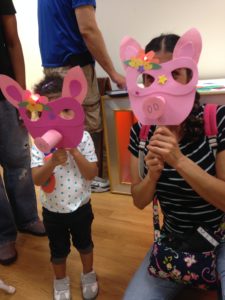 The “Maker Movement” has been gaining in popularity across the nation and around the world, but it’s really nothing new. As humans, we have always been makers. That’s how we have come to live in such a technologically rich world! The only downside? Technology has really spoiled us. Why would I make my own when I can just buy it at the store? The Maker Movement and Do-It-Yourself culture have recently gained traction as a way to reclaim our inventive nature. Make your own soap! Make your own furniture! Make your own robot! (Or at least put the tutorials on your Pinterest board and totally make them later.) There’s a pride and sense of accomplishment in creating something all on your own. Not to mention, it is fun!
The “Maker Movement” has been gaining in popularity across the nation and around the world, but it’s really nothing new. As humans, we have always been makers. That’s how we have come to live in such a technologically rich world! The only downside? Technology has really spoiled us. Why would I make my own when I can just buy it at the store? The Maker Movement and Do-It-Yourself culture have recently gained traction as a way to reclaim our inventive nature. Make your own soap! Make your own furniture! Make your own robot! (Or at least put the tutorials on your Pinterest board and totally make them later.) There’s a pride and sense of accomplishment in creating something all on your own. Not to mention, it is fun!
Museums have picked up on this trend of making and tinkering. Places like the New York Hall of Science’s Makerspace and the Exploratorium’s Tinkering Studio have lead the charge, and they have noticed something that is pretty cool: we learn best by doing! Making and tinkering are especially effective ways to learn because we become invested in our projects. I may use math to measure the perfect piece of cardboard. I apply physics when I realize that my marble roller coaster needs a steeper incline. I hone my communication skills when someone asks about my project and I have to explain my own thought process. Perhaps most obviously, I learn to problem solve. If my LED mask isn’t lighting up, there may be something wrong with my copper tape circuit. I move a few pieces of tape and adjust the battery and…. Voila! It works!
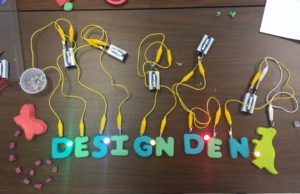 Here at the Mayborn Museum, we have been busy making and tinkering in Design Den since we announced the new space in May. We began this summer by prototyping different activities with the help of our teen volunteers. After observing visitors and listening to their comments, we found that making and tinkering activities were very popular. Some of our favorite activities were Inflatables, Squishy Circuits, and Paper Animatronics.
Here at the Mayborn Museum, we have been busy making and tinkering in Design Den since we announced the new space in May. We began this summer by prototyping different activities with the help of our teen volunteers. After observing visitors and listening to their comments, we found that making and tinkering activities were very popular. Some of our favorite activities were Inflatables, Squishy Circuits, and Paper Animatronics.
This fall, Design Den has opened in its permanent exhibit space. We have a front area of Design Den where guests can drop in anytime to build their own creations using different types of blocks. The back area of Design Den is a new workshop space where we invite guests to make and tinker for special events and programs. At our Halloween event, guests made their own LED paper masks in the workshop.
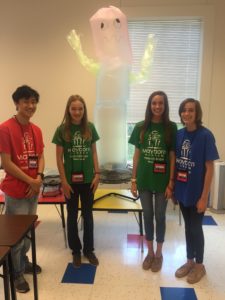 Design Den has also been busy this fall connecting with the Waco community. In October, we made LED Wearable Pins with festival goers at Science Fest. Later that month, we talked with high school students about careers in museums and invited them to tinker with Squishy Circuits at City of Waco STEAM Day. We even made stop motion videos at the Farmer’s Market in a partnership with the Museum Association of Waco’s Traveling Museum, a project coordinated by Matt Doyen, Baylor Museum Studies graduate student and Graduate Assistant for Design Den.
Design Den has also been busy this fall connecting with the Waco community. In October, we made LED Wearable Pins with festival goers at Science Fest. Later that month, we talked with high school students about careers in museums and invited them to tinker with Squishy Circuits at City of Waco STEAM Day. We even made stop motion videos at the Farmer’s Market in a partnership with the Museum Association of Waco’s Traveling Museum, a project coordinated by Matt Doyen, Baylor Museum Studies graduate student and Graduate Assistant for Design Den.
 In late October, Design Den joined the rest of the museum in welcoming families from Brook Avenue Elementary and West Avenue Elementary at our first Family Science Night, planned in conjunction with Prosper Waco. At Family Science Night, one of our activities had participants use recycled materials to make something to add to our Happy City. We asked, “What do you think a city needs to be happy?” You can see in the photo below that we had an airport, an art gallery, coffee shops, a hospital, and even a science museum!
In late October, Design Den joined the rest of the museum in welcoming families from Brook Avenue Elementary and West Avenue Elementary at our first Family Science Night, planned in conjunction with Prosper Waco. At Family Science Night, one of our activities had participants use recycled materials to make something to add to our Happy City. We asked, “What do you think a city needs to be happy?” You can see in the photo below that we had an airport, an art gallery, coffee shops, a hospital, and even a science museum!
Our last event for 2016 will be our Christmas at the Mayborn event on December 1. In Design Den, we will be making pop-up holiday cards and ornaments. We have a special activity, making stockings decorated with sewing circuits and LEDs, reserved for guests ages 8 and up.
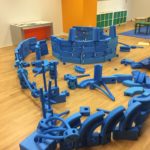 The coolest thing of all is that making is happening all over Waco. Places like Maker’s Edge on Austin Avenue, Waco ISD’s Greater Waco Advanced Manufacturing Academy (GWAMA), and even Midway Middle School’s new makerspace have begun to engage the community in making and tinkering. At Design Den, we love the idea of introducing our guests to a making and tinkering mindset that leads to bigger and better and even more awesome making, whether that’s at the Mayborn or somewhere else in Waco. Happy making!
The coolest thing of all is that making is happening all over Waco. Places like Maker’s Edge on Austin Avenue, Waco ISD’s Greater Waco Advanced Manufacturing Academy (GWAMA), and even Midway Middle School’s new makerspace have begun to engage the community in making and tinkering. At Design Den, we love the idea of introducing our guests to a making and tinkering mindset that leads to bigger and better and even more awesome making, whether that’s at the Mayborn or somewhere else in Waco. Happy making!
 Emily Clark is originally from Joshua, TX, but moved to Waco in 2009 to go to Baylor. She has two degrees from Baylor, her B.S. in Biology and her M.A. in Museum Studies. She was hired on at the Mayborn Museum in May after working there for two years as a graduate assistant. Her husband, Andy, is in his last year at Truett Seminary. They live near campus with their silly pup, Pepper, adopted from the Humane Society of Central Texas. Emily loves to binge watch TV shows, eat queso, and listen to the Eagles.
Emily Clark is originally from Joshua, TX, but moved to Waco in 2009 to go to Baylor. She has two degrees from Baylor, her B.S. in Biology and her M.A. in Museum Studies. She was hired on at the Mayborn Museum in May after working there for two years as a graduate assistant. Her husband, Andy, is in his last year at Truett Seminary. They live near campus with their silly pup, Pepper, adopted from the Humane Society of Central Texas. Emily loves to binge watch TV shows, eat queso, and listen to the Eagles.
The Act Locally Waco blog publishes posts with a connection to these aspirations for Waco. If you are interested in writing for the Act Locally Waco Blog, please email [email protected] for more information.
